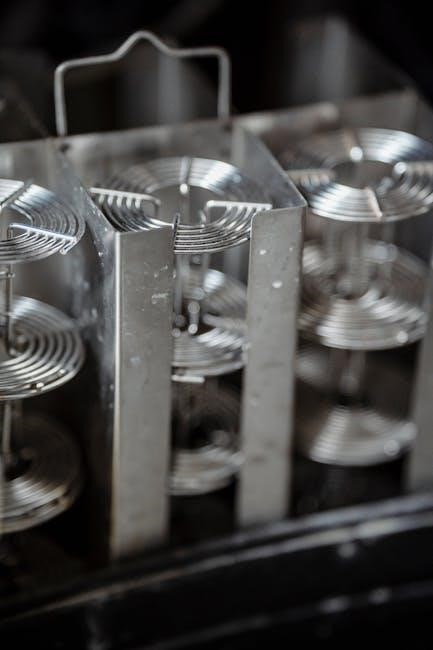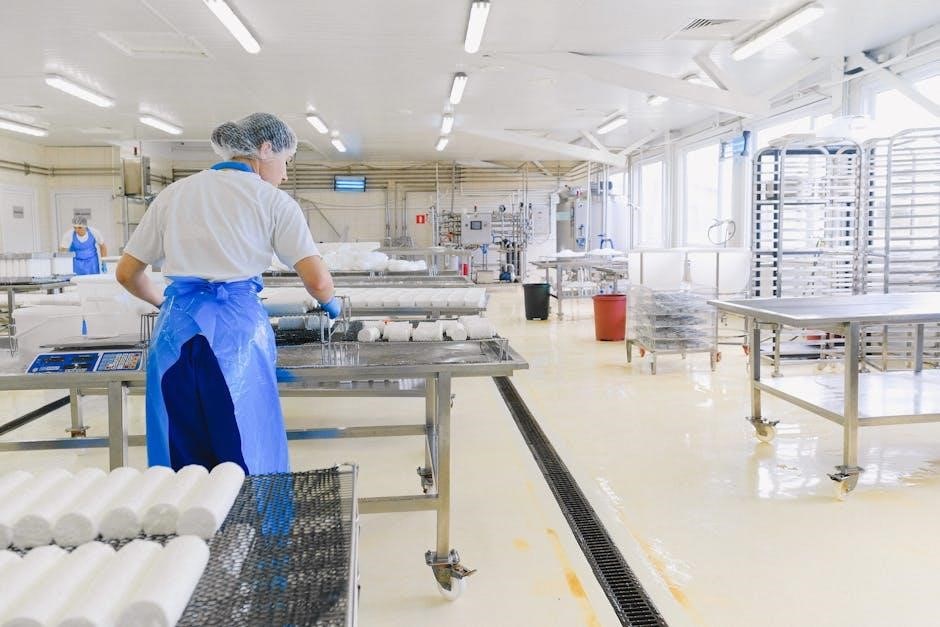The 7th edition of Fundamentals of Modern Manufacturing provides a comprehensive overview of contemporary manufacturing practices, emphasizing innovation and efficiency. It explores key technologies, sustainable methods, and data-driven approaches, offering practical insights for professionals and students.
Overview of the 7th Edition
The 7th edition of Fundamentals of Modern Manufacturing provides a detailed exploration of contemporary manufacturing technologies and methodologies. It includes updated chapters on smart manufacturing, sustainable practices, and advanced materials. The edition emphasizes Industry 4.0, automation, and data-driven decision-making. New case studies and practical examples are added to enhance understanding. The text is structured to cater to both students and professionals, offering insights into the latest trends and innovations. This edition is a valuable resource for anyone seeking to stay updated on modern manufacturing principles and applications.
Key Features of the PDF Version
The PDF version of Fundamentals of Modern Manufacturing, 7th Edition offers enhanced readability and portability. It includes embedded files, backward compatibility, and interactive features like hyperlinks and bookmarks. The format supports annotations, allowing users to highlight and add notes. Searchable text enables quick access to specific topics. The PDF is optimized for devices, ensuring seamless viewing on computers, tablets, and smartphones. It also retains the original layout and formatting, making it ideal for both academic and professional use. This version is a convenient and efficient way to access the content anytime, anywhere.

Core Concepts in Modern Manufacturing

Modern manufacturing emphasizes Design for Manufacturability (DFM), Lean principles, and sustainable practices to optimize production efficiency and reduce costs while maintaining product quality and innovation.
Design for Manufacturability (DFM)
Design for Manufacturability (DFM) focuses on optimizing product designs for efficient production, reducing costs, and improving quality. It emphasizes simplicity, standardization, and minimizing material waste. By integrating DFM principles early in the design phase, manufacturers can streamline processes, reduce assembly complexity, and ensure compatibility with production systems. This approach aligns with sustainable practices by using resources effectively and minimizing environmental impact. DFM is a cornerstone of modern manufacturing, enabling companies to deliver high-quality products while maintaining cost efficiency and meeting customer expectations.
Lean Manufacturing Principles
Lean manufacturing aims to maximize value for customers while minimizing waste. It focuses on identifying and eliminating non-value-adding activities to improve efficiency. Core principles include defining value from the customer’s perspective, mapping value streams, creating flow, pulling production, and continuously improving processes. Lean practices enable organizations to reduce lead times, lower costs, and enhance product quality. By fostering a culture of ongoing improvement, lean manufacturing empowers teams to identify and solve problems systematically. This approach is integral to modern manufacturing, driving competitiveness and customer satisfaction in a rapidly evolving industry.

Technological Advancements

Modern manufacturing leverages advanced technologies like CNC machining and additive manufacturing to enhance precision, reduce waste, and improve production efficiency, driving innovation and sustainability.
Additive Manufacturing (3D Printing)
Additive manufacturing, or 3D printing, revolutionizes production by creating objects layer-by-layer, enabling complex geometries and reducing material waste. This technology enhances prototyping, customization, and rapid production, offering unparalleled design flexibility. By streamlining workflows and minimizing tooling needs, it supports decentralized manufacturing and accelerates product development cycles, making it a cornerstone of modern industrial innovation, as detailed in the 7th edition.
Computer Numerical Control (CNC) Machining
Computer Numerical Control (CNC) machining is a precision manufacturing process guided by computer-aided design (CAD) files, enabling automated and accurate production. It enhances efficiency, reduces human error, and supports complex geometries. CNC machining is widely used in aerospace, automotive, and industrial sectors for milling, turning, and grinding operations. By integrating advanced software, it optimizes material usage and minimizes waste, making it a cornerstone of modern manufacturing for high-precision and scalable production, as discussed in the 7th edition.
Materials and Processes
Modern manufacturing utilizes advanced materials and processes to enhance performance, durability, and sustainability. Lightweight composites, alloys, and smart materials are integral, ensuring efficiency and innovation across industries.
Advanced Materials in Manufacturing
Modern manufacturing integrates advanced materials like carbon fiber, nanomaterials, and smart polymers, enhancing product performance and durability. These materials enable lightweight, high-strength components.
Innovative applications include self-healing polymers and shape-memory alloys, reducing maintenance and extending product lifecycles. Such materials are pivotal in aerospace, automotive, and healthcare industries, driving sustainability and efficiency.
Sustainable Manufacturing Practices
Sustainable manufacturing focuses on reducing environmental impact through efficient resource use and waste reduction. It integrates renewable energy, recycling, and eco-friendly materials. Technologies like IoT and AI optimize processes, minimizing emissions and energy consumption.Lifecycle assessments ensure products are designed for durability and recyclability. Collaboration with suppliers promotes ethical sourcing and circular economy principles. These practices not only benefit the environment but also enhance brand reputation and compliance with global standards like ISO 14001, driving long-term sustainability in manufacturing operations.

Supply Chain and Production Planning
Supply chain and production planning involve optimizing operations, aligning with ISO standards, and leveraging data for real-time tracking and synchronization to enhance efficiency and reduce costs.
Just-In-Time (JIT) Production
Just-In-Time (JIT) production is a lean manufacturing strategy that minimizes inventory costs by producing and delivering products just in time to meet customer demand. This approach eliminates waste, reduces lead times, and improves efficiency by ensuring that materials and processes are synchronized in real-time. By aligning production schedules with actual demand, JIT fosters a culture of continuous improvement and sustainability, making it a cornerstone of modern manufacturing systems. It also emphasizes defect prevention and seamless supply chain integration to maintain high-quality output and customer satisfaction.
Total Quality Management (TQM)
Total Quality Management (TQM) is a customer-centric philosophy aimed at continuously improving all processes within an organization. It emphasizes data-driven decision-making, employee involvement, and integrated system management to achieve excellence. By fostering a culture of accountability and collaboration, TQM ensures that every aspect of production meets high-quality standards while minimizing waste and optimizing resources. This holistic approach not only enhances customer satisfaction but also drives long-term organizational success through sustainable and reliable practices.
Future Trends in Manufacturing
Industry 4.0, smart factories, and AI-driven automation are reshaping manufacturing. Enhanced efficiency, sustainability, and customization are expected, with technologies like AI and machine learning optimizing production processes.
Industry 4.0 and Smart Factories
Industry 4.0 represents the integration of cyber-physical systems, IoT, and real-time data analytics in manufacturing. Smart factories leverage automation, AI, and machine learning to optimize production processes. The use of embedded XML in PDFs, like ZUGFeRD, enables machine-readable data, enhancing efficiency. These advancements allow for predictive maintenance, seamless supply chain integration, and personalized production. By adopting these technologies, manufacturers achieve higher efficiency, faster decision-making, and sustainable operations, positioning themselves for future competitiveness in a rapidly evolving global market.
Role of AI and Machine Learning
AI and machine learning are revolutionizing manufacturing by enabling predictive maintenance, quality control, and process optimization. These technologies analyze real-time data to identify patterns, reducing downtime and improving efficiency. Machine learning algorithms enhance supply chain management and demand forecasting, ensuring precise production planning. AI-driven systems also support defect detection and automated decision-making, fostering a more agile and adaptive manufacturing environment. By integrating AI, manufacturers achieve higher precision, reduced costs, and faster response to market demands, driving innovation and sustainability in modern production processes.
Global Standards and Compliance
Global standards ensure consistency, quality, and safety in manufacturing, enabling compliance with international regulations and facilitating access to global markets while maintaining legal and ethical practices.
ISO Standards in Manufacturing
ISO standards play a crucial role in ensuring quality, safety, and environmental sustainability in manufacturing processes. These standards, such as ISO 9001 for quality management and ISO 14001 for environmental management, provide frameworks for consistent and reliable production. They emphasize traceability, documentation, and continuous improvement. Compliance with ISO standards enhances a company’s credibility and marketability. Additionally, standards like ISO 32000 for PDFs ensure document consistency, which is vital for technical specifications and communication. Adhering to ISO guidelines helps manufacturers maintain efficiency, reduce errors, and meet global regulatory requirements effectively.
Environmental Regulations and Compliance
Environmental regulations are critical for sustainable manufacturing, ensuring processes minimize ecological impact. Compliance involves adhering to laws like ISO 14001, which focuses on environmental management systems. Manufacturers must reduce waste, emissions, and energy consumption while implementing recycling and eco-friendly practices. Digital tools, such as PDFs with embedded XML data, aid in tracking compliance and reporting. Proper documentation and adherence to these standards enhance corporate responsibility and avoid legal penalties, fostering a greener and more accountable manufacturing sector globally.
